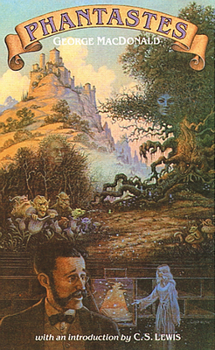Phantastes
Select Format
Select Condition 
Book Overview
Introduction by C. S. Lewis In October 1857, George MacDonald wrote what he described as "a kind of fairy tale, in the hope that it will pay me better than the more evidently serious work." This was Phantastes -- one of MacDonald's most important works; a work which so overwhelmed C. S. Lewis that a few hours after he began reading it he knew he "had crossed a great frontier." The book is about the narrator's (Anodos) dream-like adventures in fairyland, where he confronts tree-spirits and the shadow, sojourns to the palace of the fairy queen, and searches for the spirit of the earth. The tale is vintage MacDonald, conveying a profound sadness and a poignant longing for death.
Format:Paperback
Language:English
ISBN:0802860605
ISBN13:9780802860606
Release Date:May 1981
Publisher:William B. Eerdmans Publishing Company
Length:197 Pages
Weight:0.58 lbs.
Dimensions:0.6" x 6.1" x 9.0"
Customer Reviews
3 ratings
A True Classic
Published by MxGrace , 2 years ago
Now that I'm falling more into a pattern and keeping my momentum with self learning and correcting reading, I'm revisiting some old favorites.
Phantastes is just such an amazing, intriguing fairy tale. George MacDonald was truly talented! I love the world building and interweaving, the modern (for the time and recognizable even now) references to other contemporary literature. The imagination contained in the story almost makes it impossible to not use your own. And that is something truly valuable! Imagination and creativity are thick on these pages, and in the aroma of the story you find yourself enfolded.
10/10 recommend
Some of the Buried Strata of the Human World
Published by Thriftbooks.com User , 16 years ago
A warning should be printed on the title-page of this beautiful, unique book, preferably curling around a romantically decorated Gothic archway: Caution, You Are Now Entering the Realm of Dreams. Many would-be readers have found themselves bored or confused through ignorance of this simple fact. "Phantastes" is perhaps the most truly dream-like book ever written. As in a dream, one scene morphs into another; objects acquire an intense emotional significance for no apparent reason; explanations are offered and happily accepted despite their obvious failure to explain anything. George MacDonald is sadly little known, and he might have disappeared altogether but for the enthusiasm of C.S. Lewis, who called MacDonald his Teacher and said that reading "Phantastes" "baptised his imagination". I can only say that this perplexes me. Christian interpretations of this book seem to me neither more nor less plausible than Freudian ones. Interpreting a dream is like building a little cage for a soap-bubble. The same with fairy-tales, of which MacDonald was also a master. Do fairy-tales have "meanings"? If the story had a meaning that could be told, what need would there be for the story? So MacDonald was an Explorer of what we now call the Subconscious, which we consider to be Inside Us. But remember that he wasn't as clever as we are, he thought of this Realm as neither Inside nor Outside: and of course he was right. It wouldn't be true to say he was the first. Both English and German Romantics influenced him; but while they waded ever deeper and deeper, he let go and began to swim. (He acknowledges his debt with the inset story of Cosmo in Chapter 13, which could have been written by the German Romantic Novalis.) "Phantastes" is the dream we wish we could have, like opulent music, full of mossy forests, water, flowers, moonlit nights, courtly lovers, solemn buildings. It will always divide opinion: some will fling it away after a few chapters, others will treasure it, re-read and re-read it.
Phantastic!
Published by Thriftbooks.com User , 17 years ago
I came to Phantastes through Tokien and Lewis. After reading in "Surprised by Joy" the profound impact this book had on C.S. Lewis, I had to read it for myself. I was not disappointed. The book has its finger in something that modern fantasy books are mostly missing. Where modern writers tend to infuse their stories with modern men and women with swords and an older manner of speech, the very essence of Phantastes is something truly "old." There is a strong moral root to it, that is profoundly Christian, a sense of good things lost but better things gained through humility. The moral foundation of it has the weight of reality behind, and has a bitter-sweet quality to it. The line from a song sung in the book has stayed in my mind ever since I first read it (and I do not have a great head for memorizing lines) "Alas, how easily things go wrong! A sigh too much, or a kiss too long, And there follows a mist and a weeping rain, And life is never the same again." I think this line captures that "Paradise Lost" feeling present in the book quite profoundly, and yet there is much more to it than that. I could go on at length about this book, but shall leave it at this: This is a fairy tale, and a true romance, with a profound moral center. It has its roots in the old ways of thinking and the old ways of feeling. It is a bridge to the "old," the heart and soul that makes knights and maidens and chivalry and honor a fascination to this very day. It is easy to see why this book inspired the great fantasy writers of the twentieth century. I would conclude with a comment on the illustrations. I highly recommend this version as the illustrations are incredible. Arthur Hughes captures the essence of the things I spoke about above in his art. I am very glad to see this printing include the artwork that MacDonald preferred for his book, and can honestly say that it greatly increased my enjoyment of the already wonderful book.






